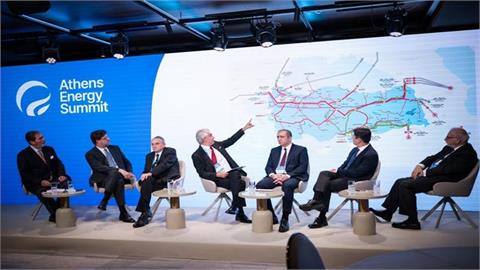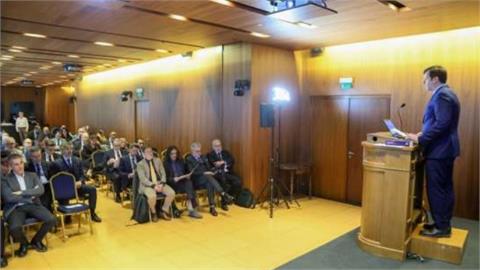“INNOPATHS”, which stands for Innovation Pathways, Strategies and Policies for the low carbon transition in Europe is an EU funded programme, which focuses on carbon neutrality from an investor’s perspective. On Wednesday, May 15 INNOPATHS organized its first workshop in Athens through its Greek partner E3 Modelling Ltd, with IENE promoting the event
"INNOPATHS”, which stands for Innovation Pathways, Strategies and Policies for the low carbon transition in Europe is an EU funded programme, which focuses on carbon neutrality from an investor’s perspective. On Wednesday, May 15 INNOPATHS organized its first workshop in Athens through its Greek partner E3 Modelling Ltd, with IENE promoting the event through its members’ network, while some of the Institute’s partners actively participated in its proceedings. INNOPATHS is a research project that aims to work with key economic and societal actors to generate new, state-of-the-art low-carbon pathways for the European Union (see https://innopaths.eu/ ).
The project’s objectives are the realization of the challenges of decarbonization and the innovation needed to address them, to present a detailed assessment of low carbon technologies, their uncertainties, assess future prospects and system characteristics, and propose policies and innovation system reforms that will help EU meet its greenhouse gas emission reduction targets. The project also aims in creating new, co-designed deep decarbonization pathways with novel policy and innovation processes for low-carbon technology development. The INNOPATHS project also puts emphasis on the societal, economic and environmental dimensions of the low-carbon transition and how they can be managed.
The project was presented by Laura Diaz Anadon (Professor of Climate Change Policy, University of Cambridge), Elena Verdolini (Senior Scientist, CMCC) and Professor Paul Ekins (University College London, HLP member – INNOPATHS coordinator). INNOPATHS is proposing two technological and financial tools, which are in the development process and are tailormade for the project to meet its objectives. The first one, the "Technology Matrix”, presents historic and projected characteristics, and associated uncertainty, of key low-carbon technologies and can be utilized to calculate the future costs of low carbon transition and the "Policy assessment framework”, which presents key evidence-based characteristics of policy instruments and mixes to encourage the low-carbon transition and can be utilized for offering information about the impact of policy instrument on several outcomes of societal interest (environmental effectiveness, cost effectiveness etc.). Professor Ekins, pointed out the major innovative approaches of INNOPATHS project, which are notably that it approaches all sectors of economic activity including agriculture, while also proposes priority research for each sector and finally proposes decarbonization as a tool for European competitiveness.
From E3 Modeling’s part, which is participating as partner in the INNOPATHS project, Professor Pantelis Capros (NTUA), presented the parameters, indicators and variables of the PRIMES model, used in INNOPATHS’s analysis, most notably energy efficiency, RES share indicator (building grids, integrate EU markets, etc.), structure of power generation, RES and Storage, gaseous fuels, transport fleet, fuel mix in transport, total electricity system costs, electricity prices investment costs etc. Professor Capros gave emphasis on the major role of electricity for the energy mix of the future, which foresees an increase in power generation from RES, while stating that nuclear energy could play a minor role in the transition. Prof. Capros also argued that the improvement of energy efficiency should be approached by a no regret option, while the major uncertainties for the future energy system could be the cost of hydrogen and e-fuels. Finally, he stated that the generalization of the standards in all sectors will be the instrument of the future and needs to be explored further.
In the second session of the conference, chaired by IENE’s head of Energy Efficiency committee, Costas Theofylaktos, a number of Greek energy market experts and company executivesparticipated in a round table discussion on the current and future challenges of the energy sector. There, Mr. Polymenopoulos representing "HELESCO energy efficiency” highlighted the role of ESCOs in the improvement of energy efficiency. Mr. Polychroniou representing "DEPA, gas industry and renewable gas” analyzed the prospects of future technologies of gas production highlighting that high utilization of chemical energy storage using renewable gas could lead to 138 billion € for EU in 2050 in comparison to an electrification scenario, based on PRIMES model results. Mr. Papastamatiou representing "ENTEKA wind energy”, one of Greece’s pioneering wind companies, addressed the licensing boundaries in RES projects noting the low success rate of wind projects, which affects indirectly electricity prices for consumers. Furthermore, he referred to the most important market requirements for the acceleration of energy transition, most notably the development of coherent specification policies, the implementation of large-scale RES projects, the capacity increase of local and international interconnections and development of large-scale central storage systems including pump-storages. Present in the panel discussion was also Dr. Sotiris Kapellos, representing HELPE Renewables, and HELAPCO, the Hellenic Association of Photovoltaic Companies, addressed the issue of PV investments in Greece and called for the simplification of licensing procedures and a full implementation of EU guidelines for electricity market liberalization (Target model, Storage, Balancing of RES etc.). Then, Dr. George Ageridis (CRES, Electromobility) addressed the electrification of the transport sector by analyzing the carbon neutrality of EVs and their energy efficiency, then switched his focus towards battery technology, which represents the key factor for EVs development. He also predicted that in 2050 the 81.5% of the electricity used for mobility could derive from RES and stated that EVs should not be seen as a market product or a market regulating tool but as part of the means for energy transition.




